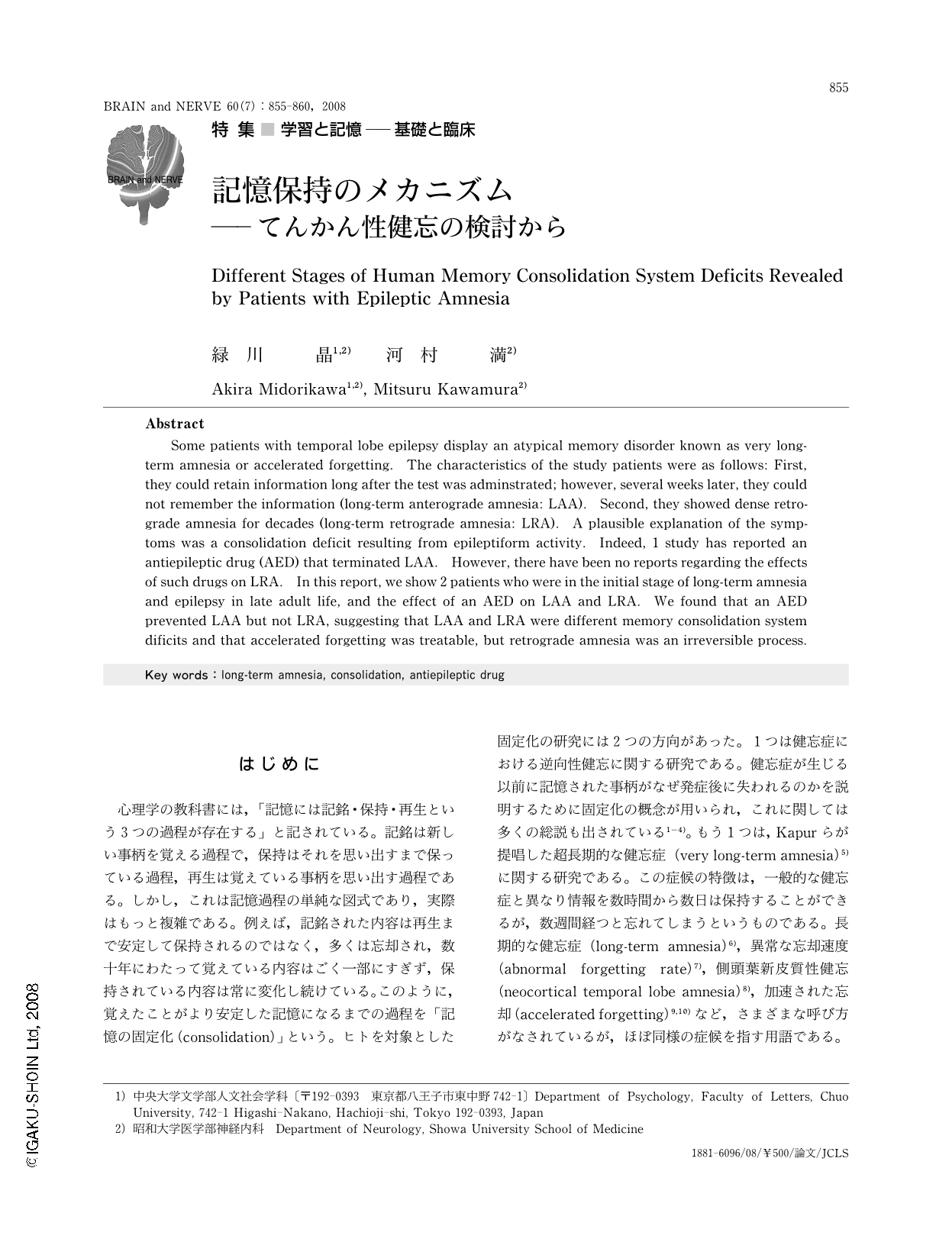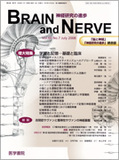Japanese
English
- 有料閲覧
- Abstract 文献概要
- 1ページ目 Look Inside
- 参考文献 Reference
はじめに
心理学の教科書には,「記憶には記銘・保持・再生という3つの過程が存在する」と記されている。記銘は新しい事柄を覚える過程で,保持はそれを思い出すまで保っている過程,再生は覚えている事柄を思い出す過程である。しかし,これは記憶過程の単純な図式であり,実際はもっと複雑である。例えば,記銘された内容は再生まで安定して保持されるのではなく,多くは忘却され,数十年にわたって覚えている内容はごく一部にすぎず,保持されている内容は常に変化し続けている。このように,覚えたことがより安定した記憶になるまでの過程を「記憶の固定化(consolidation)」という。ヒトを対象とした固定化の研究には2つの方向があった。1つは健忘症における逆向性健忘に関する研究である。健忘症が生じる以前に記憶された事柄がなぜ発症後に失われるのかを説明するために固定化の概念が用いられ,これに関しては多くの総説も出されている1-4)。もう1つは,Kapurらが提唱した超長期的な健忘症(very long-term amnesia)5)に関する研究である。この症候の特徴は,一般的な健忘症と異なり情報を数時間から数日は保持することができるが,数週間経つと忘れてしまうというものである。長期的な健忘症(long-term amnesia)6),異常な忘却速度(abnormal forgetting rate)7),側頭葉新皮質性健忘(neocortical temporal lobe amnesia)8),加速された忘却(accelerated forgetting)9,10)など,さまざまな呼び方がなされているが,ほぼ同様の症候を指す用語である。多くの症例では前向性だけではなく,数十年単位の長期にわたる逆向性健忘を伴い,共に一過性てんかん性健忘(transient epileptic amnesia:TEA)の特徴的な症候としても知られている11)。用語としては長期的な健忘が比較的多用され,本稿でもこれに準拠するが,数週間にわたって生じる前向性健忘と数十年に及ぶ逆向性健忘を分けて論議する必要があるため,ここでは前者を長期的な前向性健忘(long-term anterograde amnesia),後者を長期的な逆向性健忘(long-term retrograde amnesia)と分けることにする。
長期的な健忘はこれまでに多くの症例報告6-9,12)や,多数例の検討10,13-15)を通して確認されてきた症候であるが,多くの症例がてんかん発作を伴っていた5,6,8-10)。そのため,症候を説明する機序として,てんかん発作が長期的な前向性健忘10)や長期的な逆向性健忘16)に関与していると考えられている。しかし,てんかん発作が確認されていない症例が存在するうえに7),報告された多くの症例が皮質病変を伴い5-7,9),さらに抗てんかん薬そのものが長期的な前向性健忘に関与するという報告もあることから17),長期的な前向性健忘や逆向性健忘がてんかん発作によるか否かは明らかではない。少なくとも,てんかん発作が長期的な前向性健忘や逆向性健忘に関与するか否かを検証するためには,抗てんかん薬の投与前後での記憶機能の比較が必要である。
Corridanら18)は,抗てんかん薬の投与後に長期的な前向性健忘が消失し,投与中止後に再び健忘が出現する症例を報告しているが,逆向性健忘に関しては明らかではない。そこで本稿では,投薬前後での症状が確認できた症例を呈示するとともに,てんかん発作と長期的な前向性健忘と逆向性健忘との関連を示し,記憶がどのように保持されているのかを述べることにする。
Abstract
Some patients with temporal lobe epilepsy display an atypical memory disorder known as very long-term amnesia or accelerated forgetting. The characteristics of the study patients were as follows: First, they could retain information long after the test was adminstrated; however, several weeks later, they could not remember the information (long-term anterograde amnesia: LAA). Second, they showed dense retrograde amnesia for decades (long-term retrograde amnesia: LRA). A plausible explanation of the symptoms was a consolidation deficit resulting from epileptiform activity. Indeed, 1 study has reported an antiepileptic drug (AED) that terminated LAA. However, there have been no reports regarding the effects of such drugs on LRA. In this report, we show 2 patients who were in the initial stage of long-term amnesia and epilepsy in late adult life, and the effect of an AED on LAA and LRA. We found that an AED prevented LAA but not LRA, suggesting that LAA and LRA were different memory consolidation system dificits and that accelerated forgetting was treatable, but retrograde amnesia was an irreversible process.

Copyright © 2008, Igaku-Shoin Ltd. All rights reserved.


